20 July 2015
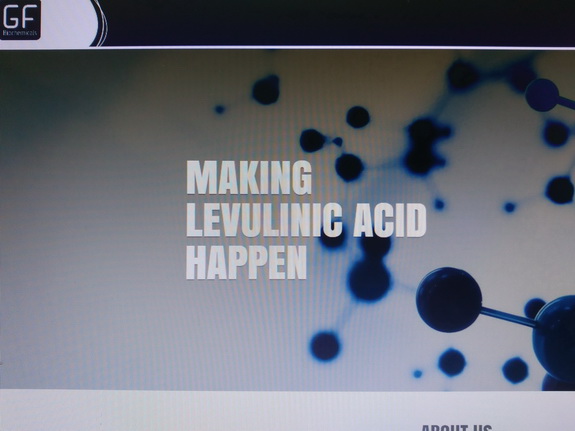
GFBiochemicals Founded in 2008, GFBiochemicals uses
breakthrough technology to commercialize
– a valuable biobased building block for
specialty chemicals and materials.

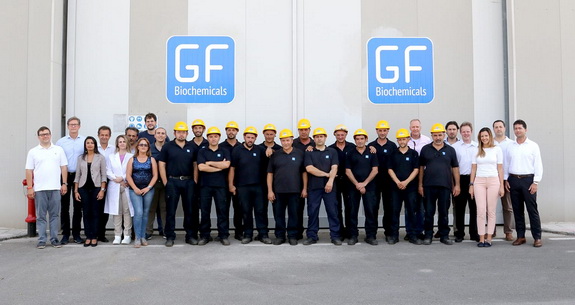
With offices in Milan, Italy and Geleen, the Netherlands,
its commercial-scale production plant is based in Caserta, Italy.
Personnel have decades of proven experience in
innovation, production and
business development of biobased chemicals.
ABOUT LEVULINIC ACID : USE AND APPLICATIONS
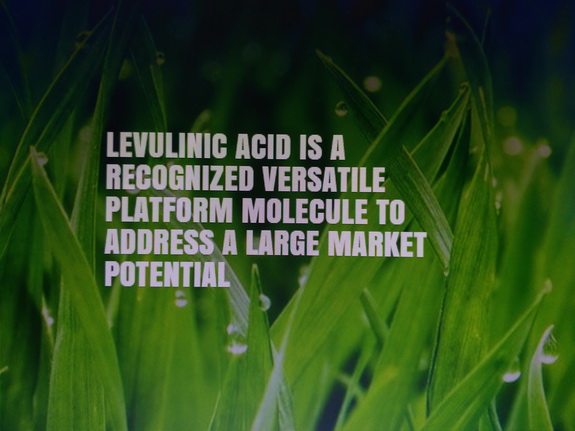
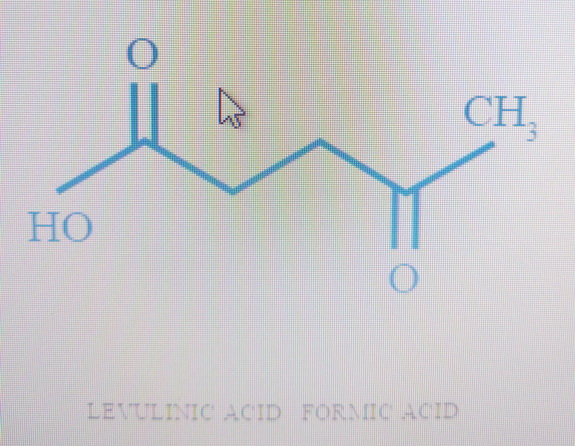
Pharmaceuticals
Levulinic Acid is used in
anti-inflammatory (e.g. indomethacin), anti-allergy agents,
mineral supplements (e.g. calcium levulinate) and
transdermal patches.
Levulinic Acid derivative
delta-amino Levulinic Acid (DALA) has increased consumption
in pharma in photodynamic treatment or diagnostics of cancer.
Flavors and fragrances
Levulinic Acid has a sweet, creamy, acidic, buttery,
guaiacol-like odour and commonly used in compositions
to create caramel, butterscotch, brown sugar, maple flavours.
Levulinic Acid esters are often used as niche fruity flavour
and fragrance ingredients.
Ethyl levulinate is a potential replacement for valencene,
a flavor currently extracted from oranges and
used in most beverages.
In Food applications Levulinic Acid
is used for multiple functions such as:
* flavoring agent derivative levulinate ester,
* alkaline earth metal salt to inhibit microbial growth in foods,
* pH regulator for food ingredients and disinfectant of fruit surfaces.
Personal care
Levulinic Acid and its derivatives are used in organic
and natural cosmetic compositions for antimicrobial, perfuming,
skin conditioning and pH-regulating purposes.
They give inherent fresh odor, prevent wrinkles,
stabilise formulations and emulsion.
Resins and coatings
Levulinic Acid can be used in
polyester coating resins, powder coatings,
unsaturated polyester resins and polyester polyols
to increase scratch resistance for interior and exterior coatings.
Diphenolic acid (DPA)
DPA is easily made from levulinic aicd.
It is a commercial chemical that will be far more attractive
at the lower cost allowed by Levulinic Acid production route.
DPA is used in some protective and decorative finishes,
but in recent years its use has been largely replaced by
the less expensive, toxic bisphenol‑A (BPA).
DPA has the potential to present itself in the future,
as a better, economical, eco-friendly and
renewable alternative to bisphenol‑A.
Polymers and plasticizers
Plasticizers are organic esters used to render polyvinyl chloride,
or PVC, more flexible. PVC is used in multiple end-markets
because it is low cost, durable and versatile.
Levulinic Acid ketal ester drivatives
can replace major phthalate-based plasticisers
which account for the majority of world’s plasticiser market.
Demand is increasing for renewable, phthalate-free plasticizers,
in applications for children’s toys and articles
as well as for products with human contact exposure.
Solvents
Gammavalerolactone (GVL)
GVL can be economically comparable with ethyl acetate,
but has value advantage with higher solvating power and
lower vapor pressure for applications in
paint stripping, softening polymers, or solubilizing intermediates
in industrial processes.
Economical GVL can be a monomer for polyester-polymer and
starting material for pyrrolidinone isomers.
Levulinic Acid based-isomers have reduced toxicity,
making them widely applicable.
Methyltetrahydrofuran (MTHF)
MTHF is currently produced from furfural
which is produced from corn cobs.
MTHF can substitute THF due to its environmental advantages and
its non-carcinogenity. Because of its lower water solubility
it is easier to recover from waste streams than THF and
generates fewer VOC emissions.
1,4-Pentanediol (PDO)
PDO can be obtained from Levulinic Acid similarly as GVL and MTHF,
but with different catalyst. A chemical similar to 1,4-Pentianediol
has existing demand for polyurethanes, but is relatively expensive.
PDO has environmental and safety advantages due to
its reduced potential leaching out other chemicals.
Alpha-methylene-gammavalerolactone (alfa-mGVL)
alfa-mGVL is a top-performing glass temperature booster
to increase functionality and performance of low-cost plastics.
It is considered for Plexiglass to improve its hardness
for scratch resistance for use to replace glass.
Its potential use is in consumer electronics, like touch-screens.
Derivatives
Levulinic Acid offers one of the largest families of
value-added derivatives. These include:
Gammavalerolactone (GVL)
Methyltetrahydrofuran (MeTHF)
1,4-Pentanediol (PDO)
Alpha-methylene-gammavalerolactone (alpha‑mGVL)
Delta-amino Levulinic Acid (DALA)
Levulinic Acid esters (LA-esters)
Diphenolic acid (DPA)
BY-PRODUCTS
Levulinic Acid production creates
useful value-added secondary chemicals.
Formic acid (FA)
Formic acid is a well-known industrial chemical
with an annual production capacity of around 800kt.
Its main used is as a preservative in life stock feed including silage.
The leather industry also consumes considerable amounts of formic acid
for tanning and finishing purposes. It is additionally used in
cleaning products where acidity is necessary in various applications.
Formic acid is a co-product of the Levulinic Acid production.
For every molecule Levulinic Acid produced in our process
one molecule of formic acid is formed as well.
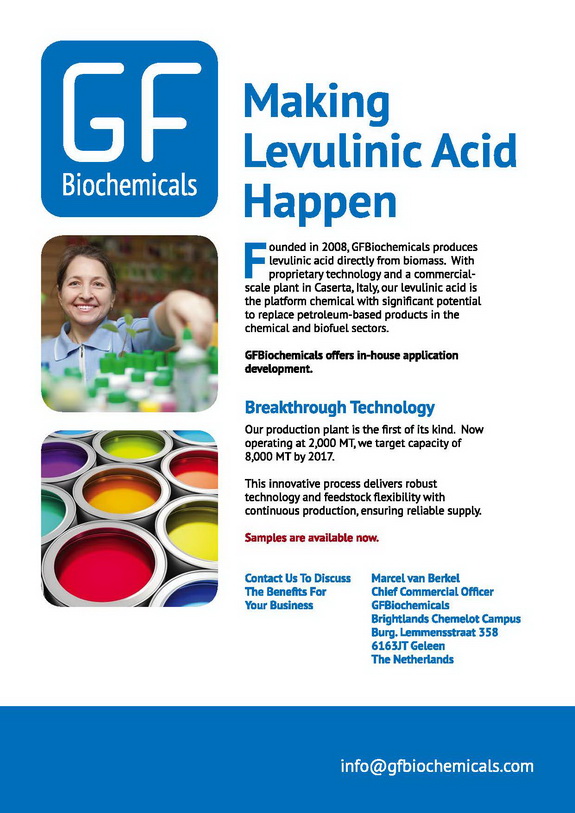
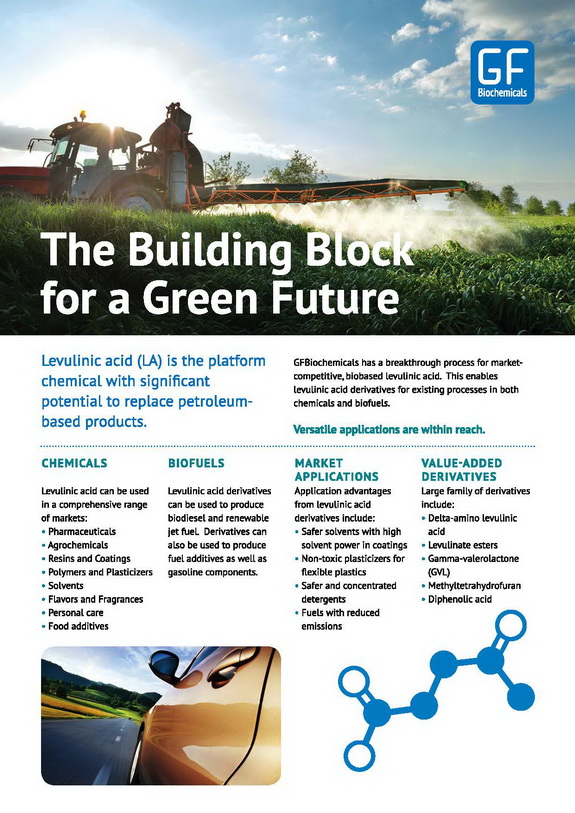
DETAILS
Biobased chemical company GFBiochemicals
has started commercial production
at its 10,000 MT/a capacity levulinic acid plant
in Caserta, Italy.
The announcement was made at the BIO World Congress
on Industrial Biotechnology, Montreal.
GFBiochemicals is the first company to produce
levulinic acid at commercial scale directly from biomass.
Maxim Katinov
CEO
“GFBiochemicals has successfully achieved a substantial milestone
– the start-up of commercial-scale production.
I would like to praise and thank our engineering and R&D teams
who have clearly demonstrated the company’s ability
to deliver results on schedule.”
Marcel van Berkel
Chief Commercial Officer
“Caserta is now the world's largest operational production plant
for levulinic acid,”
“A fundamentally lower price range is now possible
using our unique technology.
This will give access to previously undiscovered market segments.”
Media Contact
Kathryn Sheridan
Sustainability Consult
ks@sustainabilityconsult.com
Europe: +32 496 116198
North America: (202) 470 3239
WWW.CHEMWINFO.COM BY KHUN PHICHAI














